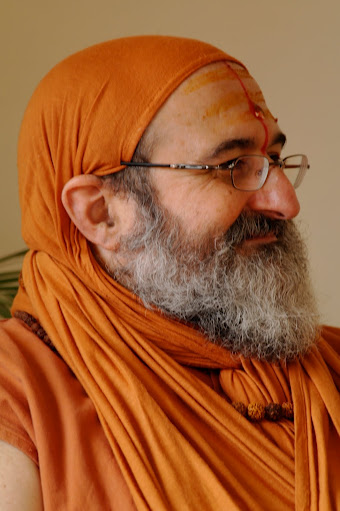Advaita Vedanta is considered to be the most influential and most dominant sub-school of the Vedanta (literally, end or the goal of the Vedas, Sanskrit) school of Hindu philosophy. Other major sub-schools of Vedanta are Visishtadvaita and Dvaita; while the minor ones include Suddhadvaita, Dvaitadvaita and Achintya Bhedabheda.
Advaita (literally, non-duality) is a system of thought where "Advaita" refers to the identity of the Self (Atman) and the Whole (Brahman). Recognition of this identity leads to liberation. Attaining this liberation takes a long preparation and training under the guidance of a guru.
The words Advaita Vedanta, like the word Hinduism, are a misnomer because they imply other Vedantas. The word ‘Advaita’ means non-dual and implies the concept of duality. Indeed, those who view Vedanta as a school of thought speak of Dwaita Vedanta, dualistic Vedanta, VishistAdvaita Vedanta, qualified non-dualism, and even Bhakti Vedanta, devotional Vedanta. Or they compare it with philosophies or religions that present similar ideas. The word ‘Advaita’ is not an adjective meant to modify a particular type of Vedanta but a word that describes the nature of the Self. Keeping in mind that words are always symbols, although non-dual implies dual, it is more appropriate to refer to the Self as non-dual than as one since one is a number that implies two, many, and even zero, nothing. Furthermore, it would be inappropriate to label Vedanta, which is merely a means of knowledge, as non-dual because it is in fact a dualistic device operating in a dualistic situation, one that ironically delivers non-dual knowledge. The ultimate source of Vedanta’s teachings are the Upanishads, documents appended to the concluding portion of each Veda. In fact the word Vedanta is a compound. Veda means knowledge and anta means end. Although Vedanta is often erroneously accused of being an intellectual discipline, it operates differently from them because it does not leave concepts behind in the mind once it has been handled by a teacher. It uses concepts to destroy false concepts about the nature of the Self. And in the process both the correct idea and the erroneous idea disappear into the vision of oneself as the Self. Since the emphasis is on removal of doubt, any interpretation of a mantra can be applied to remove the doubt, irrespective of other interpretations. For a given person one interpretation may be appropriate while the same interpretation may be inappropriate for another because he or she entertains a different doubt or formulates the doubt in a different way. Irrespective of the interpretation, Vedanta acts as a means of knowledge if it removes one’s ignorance of one’s limitless nature.
The key source texts for all schools of Vedanta are the Prasthanatrayi—the canonical texts consisting of the Upanishads, the Bhagavad Gita and the Brahma Sutras. The first person to explicitly consolidate the principles of Advaita Vedanta was Shankara Bhagavadpada, while the first historical proponent was Gaudapada, the guru of Shankara's guru Govinda Bhagavatpada.
Advaita (literally, non-duality) is a system of thought where "Advaita" refers to the identity of the Self (Atman) and the Whole (Brahman). Recognition of this identity leads to liberation. Attaining this liberation takes a long preparation and training under the guidance of a guru.
The words Advaita Vedanta, like the word Hinduism, are a misnomer because they imply other Vedantas. The word ‘Advaita’ means non-dual and implies the concept of duality. Indeed, those who view Vedanta as a school of thought speak of Dwaita Vedanta, dualistic Vedanta, VishistAdvaita Vedanta, qualified non-dualism, and even Bhakti Vedanta, devotional Vedanta. Or they compare it with philosophies or religions that present similar ideas. The word ‘Advaita’ is not an adjective meant to modify a particular type of Vedanta but a word that describes the nature of the Self. Keeping in mind that words are always symbols, although non-dual implies dual, it is more appropriate to refer to the Self as non-dual than as one since one is a number that implies two, many, and even zero, nothing. Furthermore, it would be inappropriate to label Vedanta, which is merely a means of knowledge, as non-dual because it is in fact a dualistic device operating in a dualistic situation, one that ironically delivers non-dual knowledge. The ultimate source of Vedanta’s teachings are the Upanishads, documents appended to the concluding portion of each Veda. In fact the word Vedanta is a compound. Veda means knowledge and anta means end. Although Vedanta is often erroneously accused of being an intellectual discipline, it operates differently from them because it does not leave concepts behind in the mind once it has been handled by a teacher. It uses concepts to destroy false concepts about the nature of the Self. And in the process both the correct idea and the erroneous idea disappear into the vision of oneself as the Self. Since the emphasis is on removal of doubt, any interpretation of a mantra can be applied to remove the doubt, irrespective of other interpretations. For a given person one interpretation may be appropriate while the same interpretation may be inappropriate for another because he or she entertains a different doubt or formulates the doubt in a different way. Irrespective of the interpretation, Vedanta acts as a means of knowledge if it removes one’s ignorance of one’s limitless nature.
The key source texts for all schools of Vedanta are the Prasthanatrayi—the canonical texts consisting of the Upanishads, the Bhagavad Gita and the Brahma Sutras. The first person to explicitly consolidate the principles of Advaita Vedanta was Shankara Bhagavadpada, while the first historical proponent was Gaudapada, the guru of Shankara's guru Govinda Bhagavatpada.
 |
| Disciples of Advaita Vedanta |
 |
| Brahmaśrī Dr. Mani Dravid Sastrigal |
 |
| Shri Swami Shankara Tilakananda |
 |
| Swami Dayananda |
 |
| The world’s most prominent advaita vedanta teachers. |
Source :
http://en.wikipedia.org/wiki/Advaita_Vedantahttp://www.stillnessspeaks.com/advaita_vedanta/


No Response to "Advaita Vedanta"
Post a Comment